“It’s over-the-counter, so this drug must be safe.”
“My doctor prescribed it and she knows what else I am taking, so I’ll be fine.”
Often people have a high degree of confidence that the medications we use have been thoroughly vetted and should present no cause for concern.
I thought this as well, until I got my masters degree in Pharmaceutical Engineering and learned how new drugs are actually tested and approved.
When a new drug is being studied in clinical trials, the main focus is efficacy and acute safety problems. Long term problems, such as those associated with nutrient deficiencies can be subtle and take a long time to manifest!
But over time, as more data is collected, trends and depletions can be identified and the goal of this article is to equip you to be able to look up known depletions from any medications (over-the-counter and prescription!!) that you take so that you can have an informed discussion with your health-care provider about monitoring and possibly supplementing, where needed to avoid long term consequences.
Why migraines often get worse over time
Often people will share that they have had migraines for a decade or more but that they’ve gotten worse in recent years. There are many potential reasons for this if you are familiar with our bathtub analogy, but three in particular could be related to the medication that person is using to manage their migraines.
- That medication is linked to nutrient depletions and the defficicines have been slowly building over time, now reaching a critical point.
- That medication is not addressing the root cause of the migraines, simply masking the symptoms and allowing the root cause to fester and continue to worsen. (this is almost guaranteed to be true given the nature of allopathic medicine)
- A medication has joined the mix which is known to worsen headaches and migraines (see the list from Dr. Andrew Charles)
Examples of nutrient depletions from medications that are used to manage headaches and migraines
A handy tool you can use to look up your medications (one by one or all together) is mytavin.com. Here are snapshots of a few common drugs that many migraineurs use to give you an idea, including OTC pain relievers, a beta-blocker, a tricyclic antidepressant and a hormonal birth control pill.
Note: Excedrin not listed in this directory, but is a combo of aspirin and acetaminophen and caffeine which are listed separately. And Imitrex/Sumatriptan doesn’t come up with any known deficiencies currently.
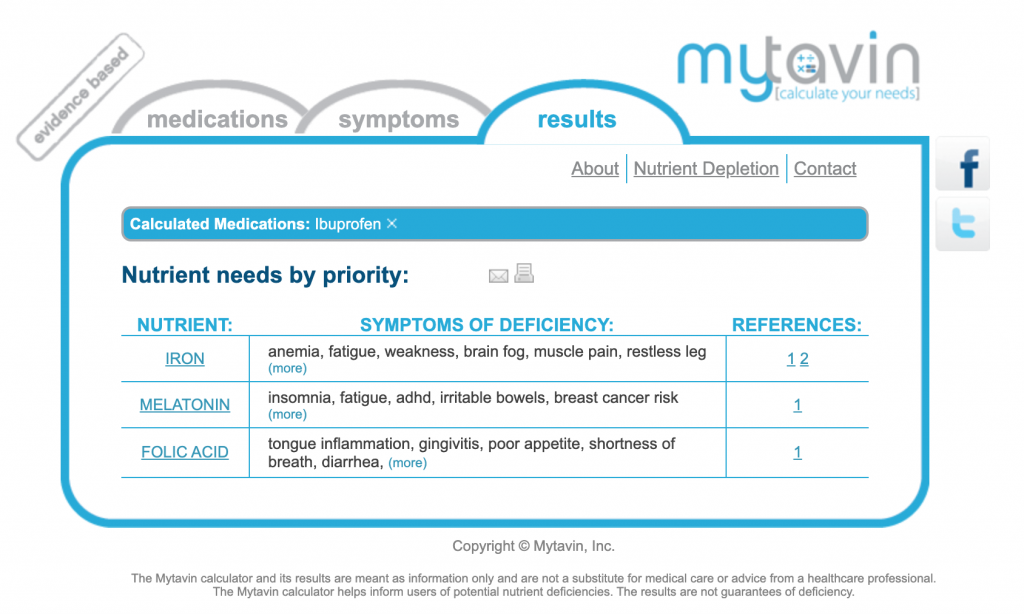
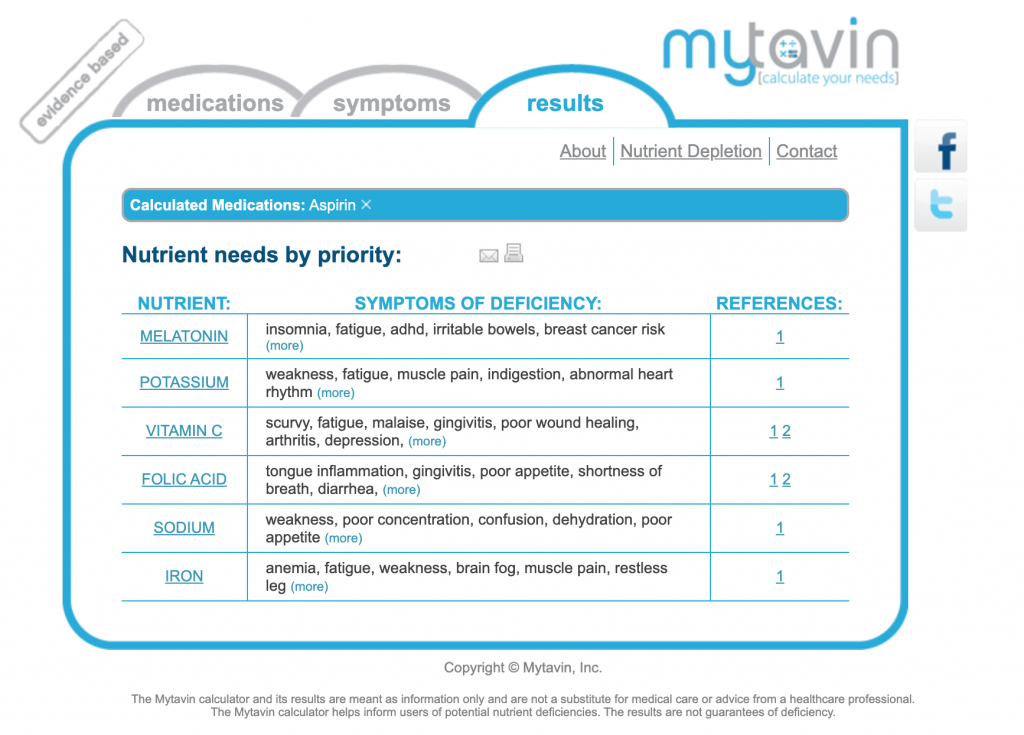
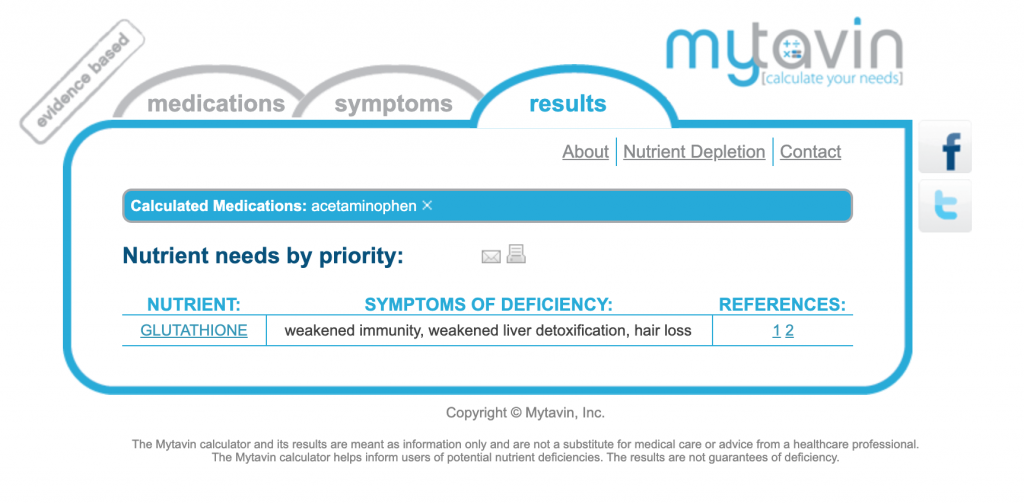
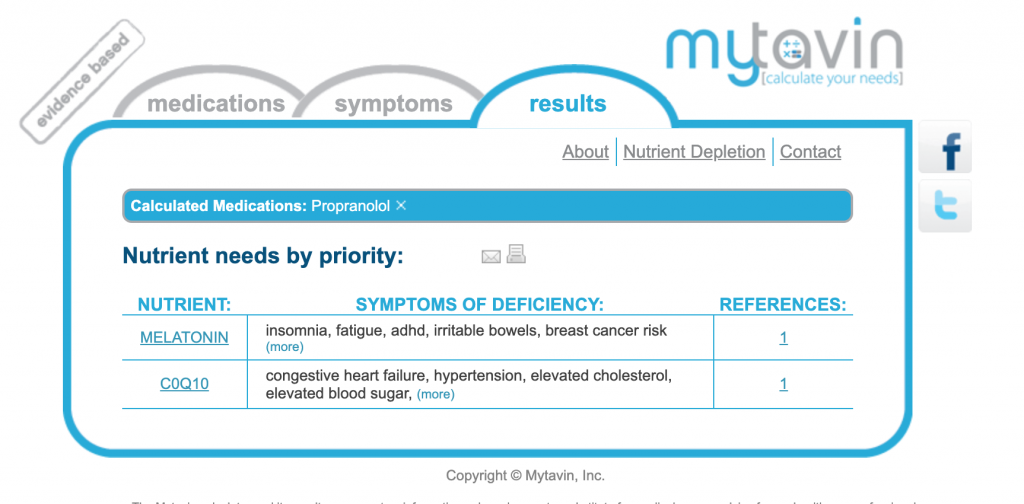
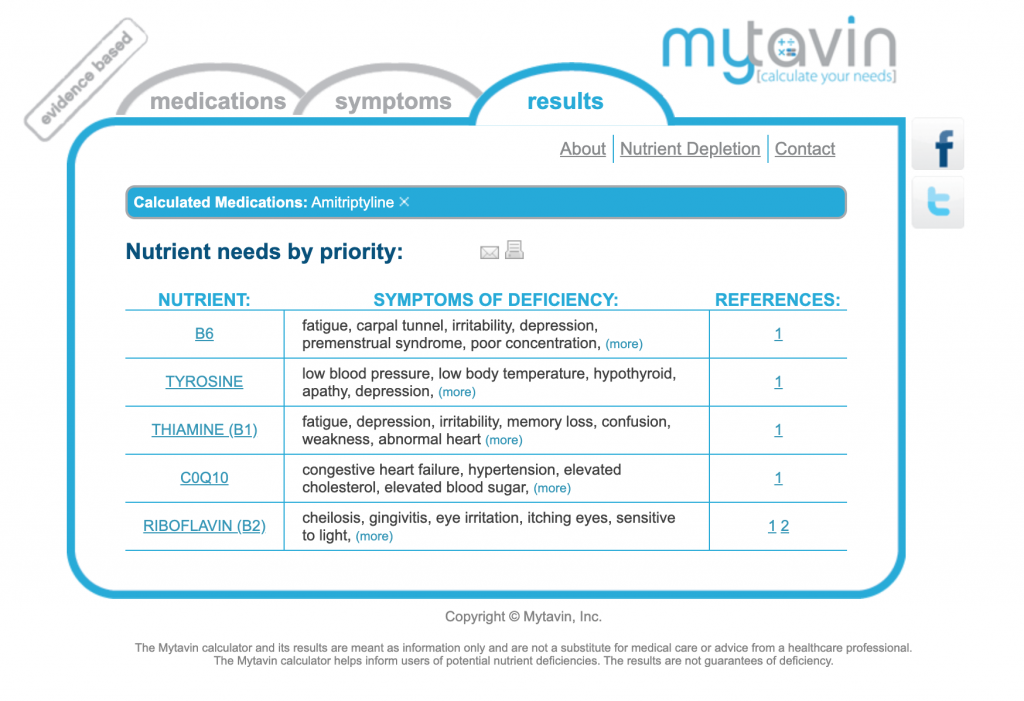
Assessing your actual deficiencies
Looking up common deficiencies doesn’t guarantee that you have that deficiency. But it can help you become aware of potential areas that you need to watch out for.
Your unique risk would be a combination of your genetics, your diet, how many medications and how long you’ve been on them. The ideal way to get an assessment of your current nutrient status is with a functional test such as the Spectracell Micronutrient test.
The Spectracell Micronutrient test looks at the white blood cells to assess your nutrient status in the last 4-6 months (vs a standard blood test for say vitamin B12 which is just looking at how much cobalamin is in your blood at that moment – not very helpful).
Here’s an 11-min video where I discuss this Micronutrient Test in more detail with Mira Dessy, NE.
Further reading
A Practical Guide to Avoiding Drug-Induced Nutrient Depletion written by Hyla Cass, MD
List of common nutrients depleted by medications from Spectracell Labs
The bottom line
If you aren’t feeling 100%, it’s time to take a step back and look at the big picture and make sure you are assessing all the factors. Fatigue, carpal tunnel, irritability, PMS, insomnia, IBS, daily headaches – these are not normal things we have to put up with and solving them could be as simple as detecting and replenishing a nutrient deficiency.
P.S. If you are reading this outside of the US and wondering how big of a deal this really could be – take a look at the stats from our government (cdc.gov) below on prescription drugs used by age group (this doesn’t include over-the-counter pain meds, antacids, etc which are taken without a second thought here in the States). Yeah…
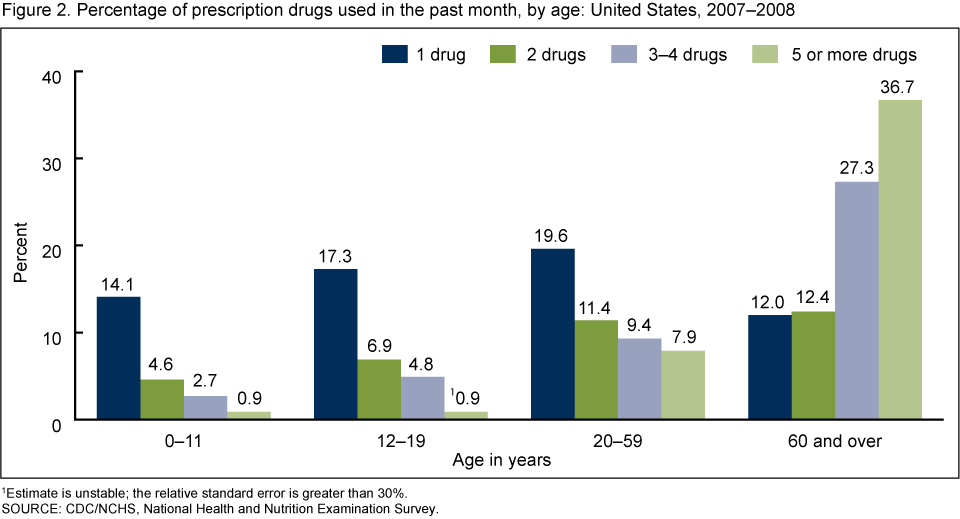
Leave a comment!
Were you surprised by any of the nutrient deficiencies /symptoms listed above? Are you going to check out the medications you use on mytavin?
If you have questions about functional testing, why it is better than conventional serum tests and how to access it – reach out at info@engineeringradiance.com


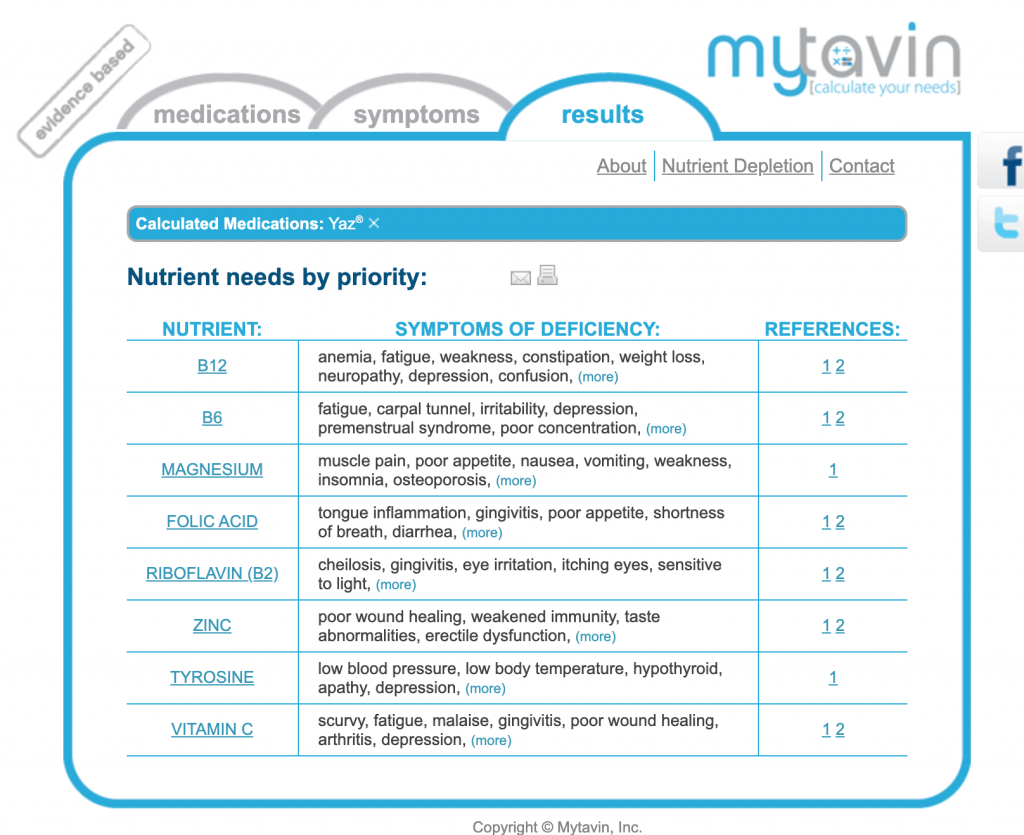


Since I became a diabetic I started to have migraine. I don’t have them that often but whenever I do its kills me. I try to stay away from medications. I take a relafen pill here and there but I avoid them. On the other hand my husband always had migraine and he feels like is getting worse. So I will send him this post. Is very informative.
Thanks, Jessica! Appreciate you sharing it and hope we can be of help.
This is some super important info for people who suffer from migraines. It is worth sharing to my friends and family.
I really need to look into this further. I was chronic for a good decade before finding relief in the new class of biologics that came out for migraine (anti-CGRP meds) a little over a year ago. Grateful for your insight!
Very glad to hear you finally found relief!
I know it doesn’t show Imitrex/Sumatriptan But what’s your opinion on deficiencies with this medicine? This is what I take and I’ve done a hair tissue test and it shows I have low minerals.
Hi Gypsy, thanks for the question! Low minerals could have a lot of reasons, for example, our soil has become depleted due to modern agriculture so most of our foods have fewer trace minerals than they used to. Certain water filters remove trace minerals along with the “bad stuff”. Our body may be using certain minerals faster to compensate for other things during times of stress. I haven’t found specifically that Imitrex depletes minerals (and also shouldn’t be taken frequently), so it probably isn’t the culprit here. It’s a great idea to monitor your heavy metal and mineral status and try to replenish the minerals though 🙂
OKAY THIS is fascinating!!! My sister suffers from chronic migraines, so I would be interested to share this with her and hear about the types of medications she uses to remedy them and then see if they are causing OTHER issues! Ugh! There are so many side effects from EVERYTHING these days!
Migraines used to rule my life- wouldn’t wish them on anyone. Eating properly and making sure I get my morning coffee usually does the trick. Great info here!
This is really helpful! I have friends who suffer from migraines. Sharing this. Such an important thing to think about.
This is an interesting post! I, fortunately, don’t have migraines but this gives me something to think about for the other medications that I do take. Thank you!
Medicine can play a very tricky role in our health system. It is very important to keep an eye out on everything when starting new medication.
I believe that every medication has side effects that might even be worse than the illness they are supposed to be treating. It’s important to read everything!
very interesting. i have to look at this more closely . i’m on a lot of medications. saving for later.
Wow! That’s a lot of information. I hope I can read more about it.
interesting statistics. thanks for all the time you put into creating those spreadsheets.
joy at http://www.thejoyousliving.com
Yet another reason I don’t like pharmaceuticals! It’s scary to think what our medicine does to us.
Read this article hoping to find information on vitamin deficiencies due to migraine prescription medication. Wish you had listed more rx along with the over the counter but still an interesting article.